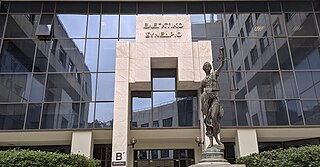
The European Court of Auditors is the supreme audit institution of the European Union (EU). It was established in 1975 in Luxembourg and is one of the seven EU institutions. The Court comprises one member from each EU member state supported by approximately 800 civil servants.

The Auditor General of Canada is an officer of the Parliament of Canada to aid accountability and oversight by conducting independent financial audits of federal government operations. These audits provide members of parliament with objective evidence to help them examine the government's activities and hold it to account.

The National Audit Office (NAO) is an independent Parliamentary body in the United Kingdom which is responsible for auditing central government departments, government agencies and non-departmental public bodies. The NAO also carries out value for money (VFM) audits into the administration of public policy.

The Federal Ministry of Finance, abbreviated BMF, is the cabinet-level finance ministry of Germany, with its seat at the Detlev-Rohwedder-Haus in Berlin and a secondary office in Bonn. The current Federal Minister of Finance is Christian Lindner (FDP).

The Cour des Comptes is France's supreme audit institution, under French law an administrative court. As such, it is independent from the legislative and executive branches of the French Government. However, the 1946 and 1958 French constitutions made it the Court's duty to assist the Cabinet and Parliament in regulating government spending. The Court thus combines functions of a court of exchequer, comptroller general's office, and auditor general's office in common-law countries. It is also a Grand Corps of the French State and mainly recruits among the best-ranked students graduating from the Ecole nationale d'administration.
Government performance auditing focuses on improving how governments provide programs and services. While there is no one universally agreed upon definition, there are key definitions which capture the scope of government performance auditing. According to the US Government Auditing Standards, "Performance audits are defined as audits that provide findings or conclusions based on an evaluation of sufficient, appropriate evidence against criteria." Additionally, the International Organization of Supreme Audit Institutions defines performance auditing as "an independent examination of the efficiency and effectiveness of government undertakings, programs or organizations, with due regard to economy, and the aim of leading to improvements.

The Supreme Audit Office is the supreme audit institution and also one of the oldest state institutions in Poland, created under the Second Republic on February 7, 1919, barely 3 months after the restoration of Poland's independence. It was created on the initiative of the Head of State, Józef Piłsudski. Its organisation and functioning are set out in the Constitution of the Republic of Poland and the NIK Act of 23 December 1994. The NIK is subordinate to the Sejm and it acts in accordance with the principle of collegial responsibility. The NIK is headed by the President who is appointed by the Sejm for a six-year term of office. The NIK performs audits related to, primarily, the execution of the state budget as well as public finance spending and management of public property by state and local governmental bodies and economic entities. Every year, the NIK submits three key documents to the Sejm: the analysis of the state budget execution and monetary policy guidelines, the opinion on the vote of discharge for the Council of Ministers and the annual report on the NIK’s activity.

In Greece, the Hellenic Court of Audit is the supreme audit institution of the Hellenic Republic, auditing the use of public funds in Greece according to the principles of legality, regularity and sound financial management. Synedrio is also the Supreme Financial Court, one of the three Supreme Courts of Justice, grounded on the Constitution, provides for its jurisdictional, advisory and auditing competences.
National Audit Office may refer to audit authorities of various national governments:
The Australian National Audit Office (ANAO) is the supreme audit institution of Australia, functioning as the national auditor for the Parliament of Australia and Government of Australia. It reports directly to the Australian Parliament via the Speaker of the House of Representatives and the President of the Senate. Administratively, the ANAO is located in the Prime Minister and Cabinet portfolio.

The Court of Audit of Belgium is a Belgian governmental institution established by article 180 of the Belgian Constitution. The Court of Audit is a collateral body of the Belgian Federal Parliament and exerts external control on the budgetary, accounting and financial operations of the Federal State, the Communities, the Regions, the public service institutions and the provinces. The task of the Court of Audit is defined in its organic law of 29 October 1846. This law gives the Court of Audit a large independence and a wide autonomy to perform its missions.
The Controller and Auditor-General is an Officer of the New Zealand Parliament responsible for auditing public bodies. John Ryan began his seven-year term as Controller and Auditor-General on 2 July 2018. The Deputy Controller and Auditor-General is Andrew McConnell. Their mandate and responsibilities are set out in the Public Audit Act 2001. They are appointed by the Governor-General on the recommendation of the House of Representatives.

The Auditor-General of South Africa (AGSA) is an office established by the 1996 Constitution of South Africa and is one of the Chapter nine institutions intended to support democracy, although its history dates back at least 100 years.

The International Organization of Supreme Audit Institutions (INTOSAI) is an intergovernmental organization whose members are supreme audit institutions. Nearly every supreme audit institution in the world is a member of INTOSAI. Depending on the type of system used in their home country, the members of INTOSAI may be variously titled the Chief Financial Controller, the Office of the Comptroller General, the Office of the Auditor General, the Court of Accounts, or the Board of Audit.
A supreme audit institution is an independent national-level institution which conducts audits of government activities. Most supreme audit institutions are established in their country's constitution, and their mandate is further refined in national legislation. Supreme audit institutions play an important role in providing oversight and accountability in a country by monitoring the use of public funds and reviewing the quality and accuracy of government financial reporting. They also contribute to anti-corruption efforts. Depending on the country, a supreme audit institution may be called a court of audit, auditor-general or the board of audit. Nearly every supreme audit institution in the world is a member of the International Organization of Supreme Audit Institutions, which works to establish and disseminate international standards and good practices.

The Office of the Comptroller and Auditor General of Bangladesh (C&AG) is the Supreme Audit Institution (SAI) of the country. Like the SAIs in many other countries across the world the institution is established by the Constitution of Bangladesh. This institute is responsible for maintaining accounts of the republic and audits all receipts and expenditure of the Government of Bangladesh, including those of bodies and authorities substantially financed by the government. The reports of the CAG are discussed by the Public Accounts Committee, which is a standing committee in the Parliament of Bangladesh.

The Federal Constitutional Court is the supreme constitutional court for the Federal Republic of Germany, established by the constitution or Basic Law of Germany. Since its inception with the beginning of the post-World War II republic, the court has been located in the city of Karlsruhe, which is also the seat of the Federal Court of Justice.

Office of the Auditor General (OAGN) is a constitutional body and the supreme audit institution of Nepal. It derives its mandate from Article 241 of the Constitution of Nepal and Audit Act, 2075. The Auditor General is empowered to undertake audits of Office of the President and Vice-President, Supreme Court, Federal Parliament, Provincial Assemblies, Provincial Governments, Constitutional bodies or their offices, courts, the Office of the Attorney General and the Nepal Army, Nepal Police and Armed Police as well as of all other government offices and courts with due consideration given to the regularity, economy, efficiency, effectiveness and the propriety of government expenditures.
The State Audit Office of the Republic of Latvia is a public auditing body overseeing the finances of national and local government in Latvia. It was first created in 1918, and re-established in 1992 when Latvia again became independent.
The Supreme Audit Institution of Antigua and Barbuda, co-officially known as the Office of the Director of Audit, is the supreme audit institution of Antigua and Barbuda, and as such, assists the Parliament in holding the government accountable in management of the country's finances and operations. The institution describes itself as "an independent, constitutionally established office that exists to serve Parliament."














